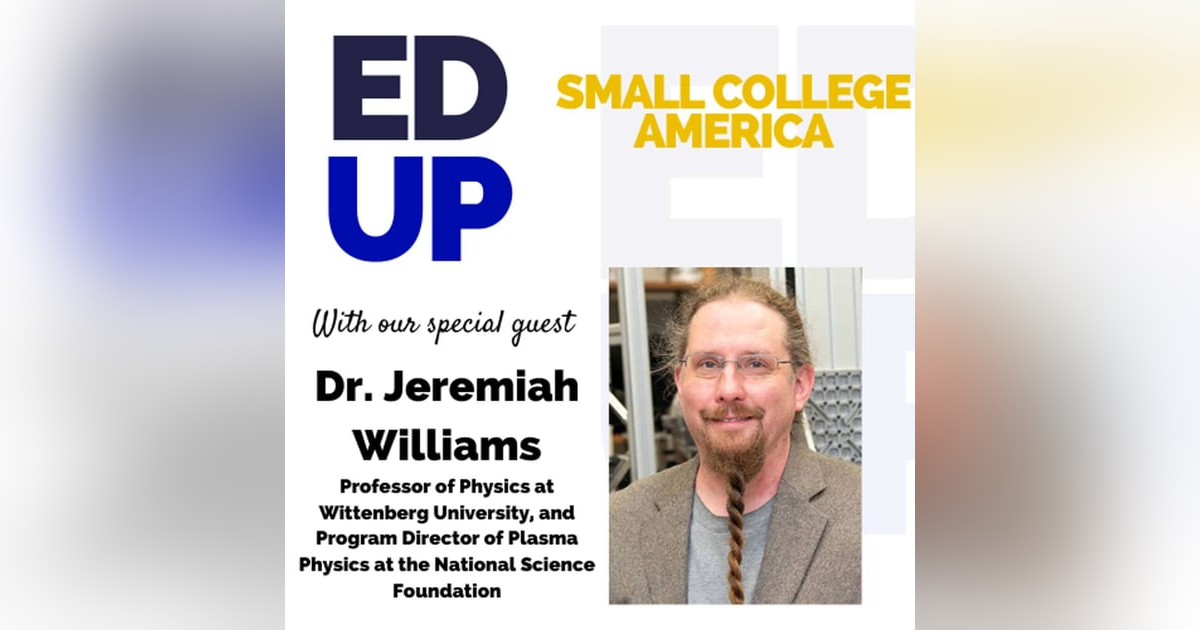Small College America Dr. Jeremiah Williams - Professor of Physics Wittenberg University

We welcome Dr. Jeremiah Williams, a Professor of Physics at Wittenberg University since 2007, where he teaches the full spectrum of undergraduate courses and leads an undergraduate-focused research program in plasma physics. He received a BS in Physics and Mathematics from Dickinson College, an MS in Physics from the University of California, Los Angeles, and a PhD in Physics at Auburn University.
His area of research is experimental plasma physics with a focus on dusty plasmas, and the National Science Foundation, the US Department of Energy, and NASA have funded his work. He has also been active in the intermediate and advanced physics laboratory community. He has been an active member of the American Physical Society (Division of Physics), the American Association of Physics Teachers (AAPT), and the Advanced Laboratory Physics Association (AAPT), where he has served on a variety of committees and task forces. He is currently on detail to the National Science Foundation, where he serves as a program director for the Plasma Physics program.
Q1: Jeremiah, you’ve had an impressive academic journey—from Dickinson to UCLA to Auburn—before joining Wittenberg in 2007. Could you talk about what drew you to a small liberal arts university, and what has kept you there for nearly two decades?
Q2: You’re currently serving as a Program Director for the National Science Foundation’s Plasma Physics program. How does that experience benefit not only you professionally, but also Wittenberg and your students? Could you share one or two examples of how your NSF role has created opportunities or insights that you’ve brought back to campus?
Q3: Wittenberg is known for its liberal arts ethos. In your view, how does that kind of education uniquely prepare physics students—who may go into research, industry, or even careers outside of science?
Q4: One of the themes we return to on this podcast is the transformative power of small colleges. Could you share a story of a Wittenberg student who started in your classroom or lab and went on to do something remarkable?”
Q5: Many small colleges have faced financial pressures — including difficult decisions about budgets, academic programs, and faculty positions. From your vantage point as both a professor and an NSF leader, what do you see as the biggest challenges facing small colleges today, particularly in sustaining strong STEM programs? And where do you see the greatest opportunities for them to thrive?
Q6: As you reflect on your career at Wittenberg and your national work, what excites you most about the future of undergraduate science education? And on a personal level, what has been most rewarding for you in teaching, mentoring, and researching at a small college?”
Closing
Kent Barnds: Dr. Williams, thank you for being with us today. For those listening, if you’d like to learn more about Small College America, go to www.smallcollegeamerica.net where you can find details on upcoming episodes, connect with us, and suggest topics for future conversations. This episode of Small College America is made possible with underwriting support from Perspective Data Science, a firm specializing in AI-powered tools and data solutions, including the Financial Compass platform.
On behalf of our guest, Dr. Jeremiah Williams, my co-host Dean Hoke, and myself, thank you for listening.



